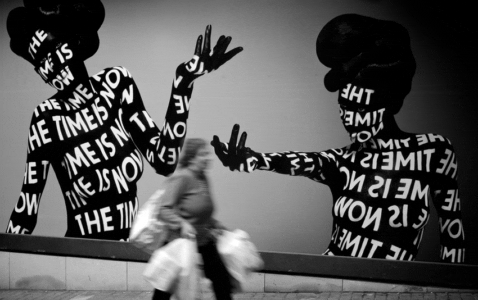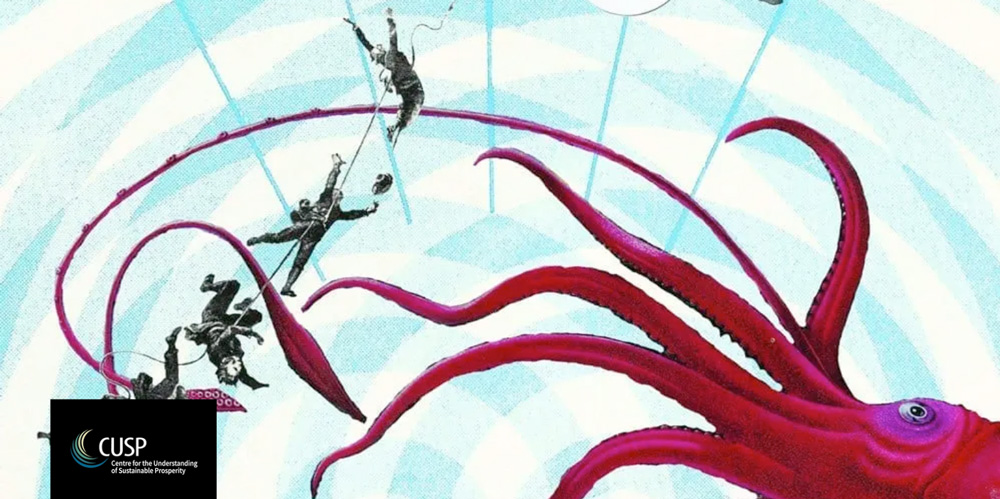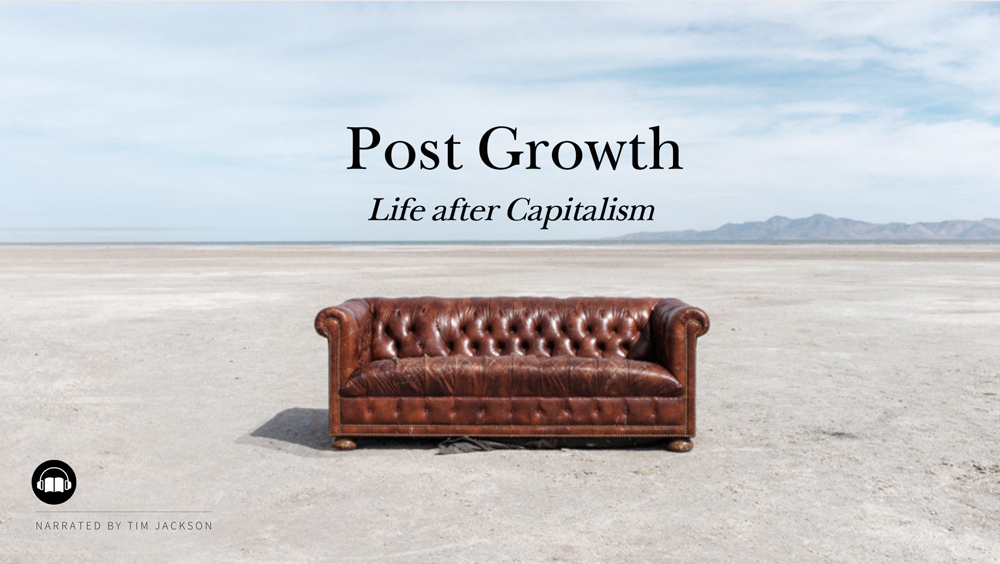Imagining a world beyond consumerism
Consumerism is deeply problematic, but despite its obvious limitations, harms and absurdities, it is remarkably difficult to displace as our default societal setting and plot. Consumerism has become our prevailing cultural and economic modus operandi and is fundamentally more logical than it might at first appear. (This article first appeared on the Perspectiva blog page.)

I am responding to a brief about how we might go ‘beyond consumerism’, which is much harder than it sounds. Consumerism is deeply problematic, but despite its obvious limitations, harms and absurdities, it is remarkably difficult to displace as our default societal setting and plot.
Consumerism is not consumption, which is a basic human activity that predates capitalism. Hunter gatherers, for instance, consumed the products of land and used animals for various ends. Consumerism is not capitalism either which is a slippery notion that takes many forms, but it is a key aspect of the most common modern expression of it.
Consumerism is simply our prevailing cultural and economic modus operandi. It is what we do, to some extent who we are, and it is ideological in nature because it defines our sense of normality. Perhaps consumerism is what capitalism does to consumption — it turns a simple human activity into something culturally hegemonic.
The familiar critiques of consumerism include its deleterious ecological impact, its failure to offer enduring satisfaction and the comical absurdity of ‘spending money you don’t have to buy things you don’t want to impress people you don’t like.’ So consumerism is unsustainable, unrewarding and ultimately absurd. Yet it endures, and it’s hard to imagine replacing it.
Why?
Consumerism is fundamentally more logical than it might at first appear. I started thinking about this after connecting two references that use ‘logic’ in untypical ways. Tim Jackson writes about ‘the social logic of consumption’ in Prosperity without Growth (2nd edition, 2017) and Martijn Konings has published a (brilliant but inaccessible) book called The Emotional Logic of Capitalism (2015).
Konings is particularly noteworthy because he believes progressives of all stripes fail to grasp that money is more like an icon than an idol, in other words it is not something people worship in itself (‘Money is God’) but rather something that represents forms of life that people identify with (‘Money is me’).
“Progressivism, in short, overlooks the immense social and psychic power of capitalism to be affectively persuasive”. This line comes from a good review of the book by Bryant William Sculos who adds: “Put simply, capitalism and its subjects are co-constitutive of everyday life, and therefore any comprehensive analysis or critique of capitalism, must take the emotional and meaning-producing aspects as central defining characteristics of contemporary capitalism. This is “what progressives have missed.”
Forget about ‘progressives’ for a second, and remember that consumerism as usual is just not an option full stop. If nothing else, consumerism drives our use of fossil fuels, which are the preeminent cause of climate change, a pre-competitive issue for everyone: no viable planet, no competition.
The first part of the answer is about the ideological context for modern consumerism, neoliberalism (‘The state led remaking of society on the model of the market’ — Will Davies). It has become hard to be intentional about the future — to imagine and shape the worlds we want to live in — because the modern state rarely assumes any role in doing that or in encouraging us to do it either. I wrote about this challenge last week in my new capacity as a CUSP Fellow — here. That’s not about going beyond consumerism as such, but it is an important part of the context, and helps explain why the right level of analysis for consumerism is probably the level of the social imaginary.
‘Imaginary’ is not a term widely used in public debate, but it has been developed by the Canadian Philosopher Charles Taylor and the Greek-French social critic Cornelius Castoriadis amongst others. I think it’s an increasingly necessary conceptual tool to make intellectual sense of what is going on in the world. Perspectiva’s researcher Sam Earle gives a good overview of what it means, with a simple definition of an imaginary being: “the encompassing paradigm of ideas, beliefs and practices that makes society possible.”
The imaginary is not ‘the system’, it’s not ‘the culture’, it’s not ‘the ideology’ — it is our experience of navigating all of these things in search of a sense of acceptable behaviour and desirable forms of life. We are stuck in a consumerist imaginary and it is very hard to see a way out of it because we see through it. Imaginary is related to imagination in some very specific senses, and this is one of them — our imaginaries constrain our imaginations because they circumscribe our felt sense of what is knowable, viable and doable. As Pablo Picasso once put it: “Everything you can imagine is real.” To which I would add: but only everything you can imagine.
The relationship between imaginaries and logics has not been developed to my knowledge, but here is one way to look at it. People, communities, organisations and governments do things for reasons that make sense relative to their imaginary, but not otherwise. The background setting that shapes implicit operational logics and narrative parameters. The imaginary determines when explanations need to be given, and when they don’t. This helps make sense of why growth is endlessly discussed, with all its adjectives (inclusive, green, strong, low) but the need and desire for growth as such is rarely considered ‘on the table’ in public discussions. It is not so much a policy idea to be debated as the idea that determines which policies are to be debated — that’s why the notion of imaginary is helpful — it reveals what we are subject to, and what we can ‘take as object’ and relate to through discussion.
What then are the implicit logics of consumerism, and what would it take to get beyond them?
The emotional logic of consumerism is about meeting human emotional needs. A detailed account of emotional needs is outlined in the impressively well evidenced and interdisciplinary ‘Human Givens’ approach whereby it is argued that we all need security, autonomy and control, status, privacy, attention, connection, intimacy, competence and achievement, meaning and purpose.
The important thing to grasp here is that such emotional needs do not seem to be ‘socially constructed’ — they are a function of being a human animal and appear to be universal. The basic proposition is that all emotional distress and mental illness are caused by a failure to get innate needs, particularly emotional needs, met in balance.
And here is the thing that is hard to accept for many. Consumerism, for all its faults, does meet all of the above emotional needs, at least to some extent, and the other logics of consumerism are in some ways derived from this basic achievement. It follows that the key to going ‘beyond consumerism’ is to understand these emotional needs better and fulfil them in different ways.
The social logic of consumerism is about meeting the need to create, maintain and experiment with identity (status, attention, connection, meaning) and there is a role for conspicuous consumption in that process in that at an experiential level, at least momentarily, ‘you are what you buy’. The key psychological process here is cathexis which describes a process of attachment that leads us to identify material possessions as part of our selves — those things — homes, cars, clothes, teddy bears that we consider ‘part of us’. (Attachment to rupas in Buddhism fulfils a similar function.)
The economic logic of consumerism is about meeting the need to maintain the cycle of investment and return through growth that keeps the economy functioning — that’s what keeps us in ‘jobs’ and our livelihoods intact (security, autonomy and control, meaning and purpose). However, Tim Jackson pertinently asks (ibid p117): “Is the system still serving us, or is rather that we are now serving the system?”
The technological logic of consumerism is that it meets a need for novelty which stems from other needs, for instance competence and achievement in relation to a new phone, or meaning and purpose through a new car.
The legal logic of consumerism is that it meets a need for ownership (privacy, status, control) not only directly, but by creating markets for products stemming from ideas that can be owned through intellectual property protection.
The political logic of consumerism is a little harder to fathom. It meets a need for better futures (security, purpose, control) such that politicians can make promises on which to get elected, for instance by improving purchasing power through tax breaks, or job creation.
The spiritual logic of consumerism is a deeper question, and Tim Jackson seems to argue that it is about allaying anxiety by ‘filling the empty self’. In 1955, economist Victor Lebow stated the point more broadly:
“Our enormously productive economy demands that we make consumption our way of life, that we convert the buying and use of goods into rituals, that we seek our spiritual satisfaction and our ego satisfaction in consumption. We need things consumed, burned up, worn out, replaced and discarded at an ever-increasing rate.”
The mention of rituals is noteworthy, but I wonder if a deeper way to state the point is that consumerism meets the spiritual need not to think about death, through endless ritualistic distraction. A much wider discussion of spiritual need is detailed in my 2014 report, Spiritualise.
Jackson sums up why consumerism is so ‘sticky’ as follows(Ibid p116):
“The empty self is a product of powerful social forces and the specific institutions of modern society. Individuals are at the mercy of social comparison. Institutions are given over to the pursuit of consumerism. The economy is dependent on consumption for its very survival….Perhaps the most telling point of all is the rather too perfect fit between the continual consumption of novelty by households and the continuous production of novelty in firms. The restless desire of ‘the empty self’ is the perfect complement for the restless innovation of the entrepreneur. The production of novelty through creative destruction drives (and is driven by) the appetite for novelty in consumers.”
If consumerism meets emotional needs, and if those emotional needs manifest through a variety of logics, and if those logics derive their validity from our prevailing imaginary, what follows for how we go ‘beyond consumerism’?
In essence, we need to disembed ourselves from the prevailing consumerist imaginary and introduce competing logics that meet our emotional needs in different ways.
How we might do that will be the subject of my next post.
The blog is the first in a series of blogs. For further reading, please visit the Perspectiva website.



